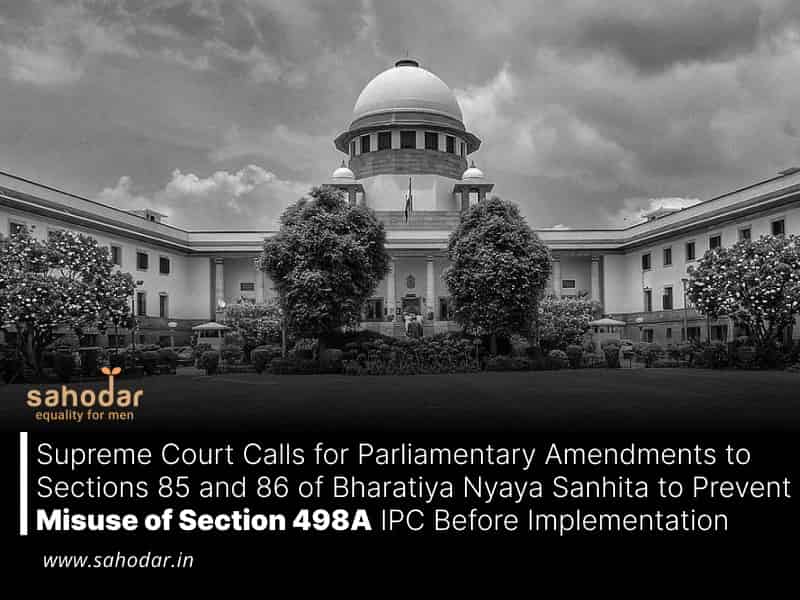While dismissing a criminal case initiated by a wife against her husband under Section 498A IPC, the Supreme Court has urged the Legislature to contemplate necessary revisions in Sections 85 and 86 of the Bharatiya Nyaya Sanhita, 2023, prior to the enforcement of the new provisions.
The Court highlighted that the Legislature had not given due consideration to recommendations it put forth 14 years ago in the Preeti Gupta v. State of Jharkhand 2010 Criminal Law Journal 4303 case. In that ruling, it was emphasized that a thorough reassessment of the entire provision (Section 498A IPC) is imperative.
The Court was addressing a criminal appeal filed by a man against the High Court’s verdict, which had dismissed his plea and refused to annul the chargesheet under Sections 323, 406, 498A, and 506 of the Indian Penal Code (IPC).
The two-Judge Bench comprising Justice J.B. Pardiwala and Justice Manoj Misra said, “We request the Legislature to look into the issue as highlighted above taking into consideration the pragmatic realities and consider making necessary changes in Sections 85 and 86 respectively of the Bharatiya Nyaya Sanhita, 2023, before both the new provisions come into force.”
Advocate Yusuf acted on behalf of the appellant, while Advocates Parveen Kumar Aggarwal and Chritarth Palli represented the respondents.
In this instance, the appellant (husband) and his family members were accused of demanding dowry, leading to mental and physical anguish for the complainant (wife). Moreover, the husband was accused of alcoholism, regularly subjecting his wife to physical abuse and cruel treatment, along with engaging in an extramarital affair.
Consequently, an FIR was lodged by the wife, resulting in a closure report against the other accused after police investigation, while a chargesheet was filed against the husband. Seeking to annul the criminal proceedings, he petitioned the High Court for quashing, but the plea was rejected. Hence, he approached the Supreme Court in appeal.
The Supreme Court in the above context of the case observed, “If the Court is convinced by the fact that the involvement by the complainant of her husband and his close relatives is with an oblique motive then even if the FIR and the chargesheet disclose the commission of a cognizable offence the Court with a view to doing substantial justice should read in between the lines the oblique motive of the complainant and take a pragmatic view of the matter. … if the wife on account of matrimonial disputes decides to harass her husband and his family members then the first thing, she would ensure is to see that proper allegations are levelled in the First Information Report.”
The panel emphasized that often professional assistance is sought in such matters, and once a complaint is formulated by a legal expert, it becomes exceedingly challenging to identify and rectify any loopholes or shortcomings thereafter.
“However, that does not mean that the Court should shut its eyes and raise its hands in helplessness, saying that whether true or false, there are allegations in the First Information Report and the chargesheet papers disclose the commission of a cognizable offence”, it further added.
The Court stated that the Police force cannot be employed to pressure the husband into compliance, enabling the wife, at the urging of her parents, relatives, or friends, to extract concessions. Moreover, in situations where the wife alleges mistreatment or harassment, Section 498A of the IPC should not be applied in a mechanical manner.
“No FIR is complete without Sections 506(2) and 323 of the IPC. Every matrimonial conduct, which may cause annoyance to the other, may not amount to cruelty. Mere trivial irritations, quarrels between spouses, which happen in day-to-day married life, may also not amount to cruelty. … we have reached to the conclusion that if the criminal proceedings are allowed to continue against the Appellant, the same will be nothing short of abuse of process of law & travesty of justice. This is a fit case wherein, the High Court should have exercised its inherent power under Section 482 of the Cr.P.C. for the purpose of quashing the criminal proceedings”, it concluded.
The Court also cited its judgment from 14 years ago in the case of Preeti Gupta v. State of Jharkhand, published in the 2010 Criminal Law Journal 4303 (1).
Consequently, the Court instructed the Registry to dispatch one copy of the judgment to both the Union Law Secretary and the Union Home Secretary.
As a result, the Supreme Court granted the appeal, nullified the contested order, and annulled the proceedings.

